
Yelp seems to focus into view at every turn in the review space. Yet, in looking at website analytics over the years, I’ve rarely seen Yelp contribute more than a few percent to actual conversions and sales.
In my perception, Yelp has an outsized presence far disproportionate to its impact.
Let’s look at some data points so we can better understand the reality of Yelp’s presence in the review space and just how important Yelp is to a typical business.
A Storied History Or the Last Man Standing?
Yelp first hit my radar in 2006 when I was writing about the factors that seemed to influence Google Local ranking. At that time, I identified at least ten restaurant review sites including the likes of Frommers, Travelocity, and the MobileTravel Guide. Yelp, the newbie on the block at the time, was the least among them.
Obviously Yelp grew and grew in importance over time as they moved beyond restaurants into the general review space. In the Local Search Ranking Factors survey in 2009, Yelp was identified as one of the most prominent general review sites among a list of 11 important sites of the time that included Yahoo, CitySearch, and Google. Google even offered to buy them for $550 million in 2009 but Yelp turned down the Google offer.
Now, Yelp is one of four sites commonly used in the restaurant space along with TripAdvisor, Google, and the relative newcomer OpenTable. The many others are all or mostly gone. And, Yelp is one of only three sites considered important in the general review space that includes themselves, Google, and Facebook. Truth be told, Facebook seems to have thrown in the towel leaving Google and Yelp as the remaining multi-category review sites on everyone’s mind.
Yelp’s Unique Approach to Reviews
Yelp, early in its history, made the decision to be a long-form review site where each review included more rather than fewer details. They made conscious decisions to limit the number of reviews from new users, favor folks that wrote long reviews, and to support users that heavily engaged with the site. This is in stark contrast to Google’s approach of welcoming all reviewers.
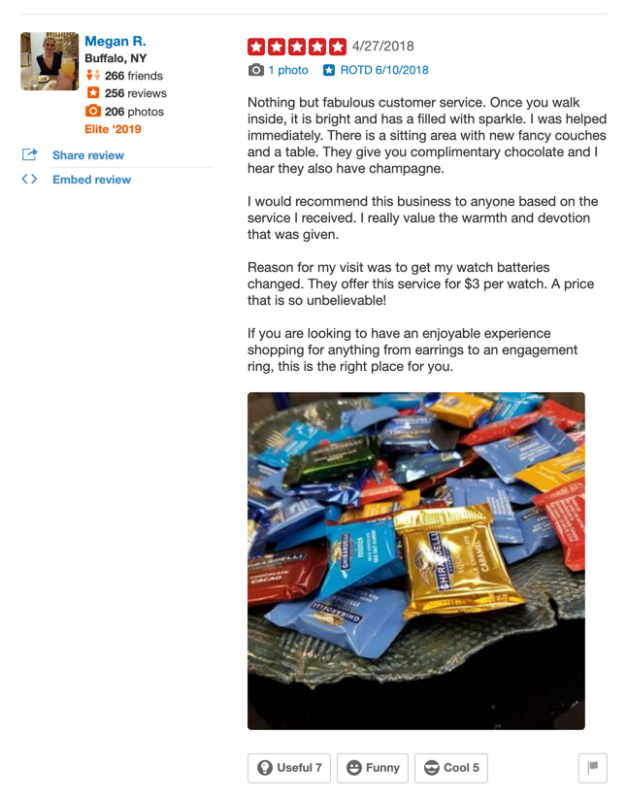
The above Yelp review of Barbara Oliver is both typical and emblematic of Yelp’s approach to reviews. Barbara often sells jewelry in the range of $2000-$5000+ for a single purchase yet this Yelp reviewer with 264 Yelp friends and 256 reviews felt it important to write a four-paragraph review AND add a photo about a $3 battery purchase. I guess Yelp Elite need to write about something.
If users are not willing to commit to writing numerous reviews with copious details they are not really welcome to write anything at the site. Occasional users that try to leave a review on Yelp will likely have their review buried in the “not recommended” abyss and end up only reading reviews. They never fully engage with the totality of the Yelp product.
Yelp has also decided, unlike Google and TripAdvisor, to actively discourage individual businesses from asking for reviews on their site. Not only have they made it against their terms of service to ask for reviews but have in fact sued several review companies that helped businesses solicit reviews.
Google actually made a review solicitation link available via their API thus encouraging businesses to ask for reviews at scale. Yelp, on the other hand, has told its largest agency and biggest direct partners that not only can they not ask for Yelp reviews but they are forbidden from asking for reviews at any 3rd party site. If these large agency and direct partners violate their agreement by asking for reviews at say Google or Facebook, they are liable for large daily monetary fines.
Clearly Yelp wants long form reviews from a few really active reviewers or no reviews at all and thinks that they have the power to influence the rest of the industry. But… do they?
User Behavior Impacts Yelp’s Traffic
Historically Yelp has relied on Google search for new users and saw significant user growth. But, with the ever-encroaching local search results on Google, one assumes that they are getting much less referral traffic than they once were.
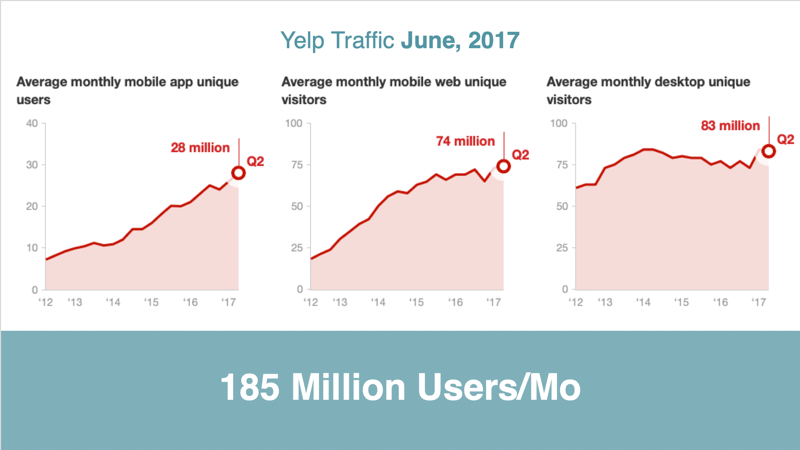
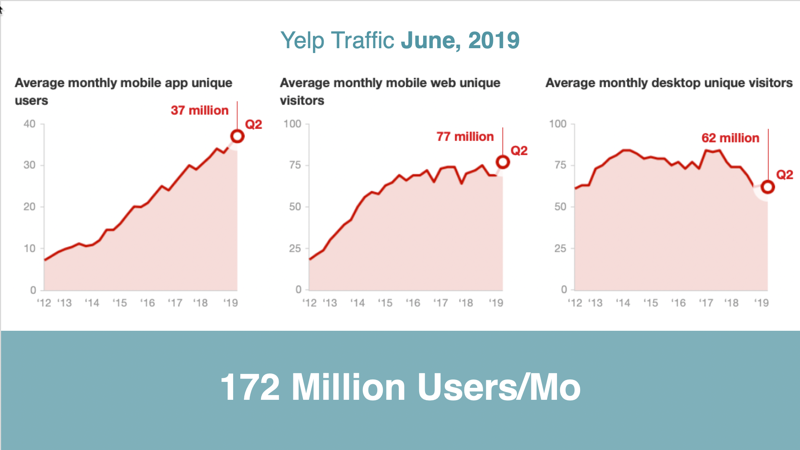
Yelp made a strong push to get users to adapt their mobile app with some success but their app traffic is not making up for the decline of desktop and mobile traffic. Yelp experienced peak traffic in 2017 and have seen declines ever since. With their traffic steady or in decline, their influence is certainly not growing.
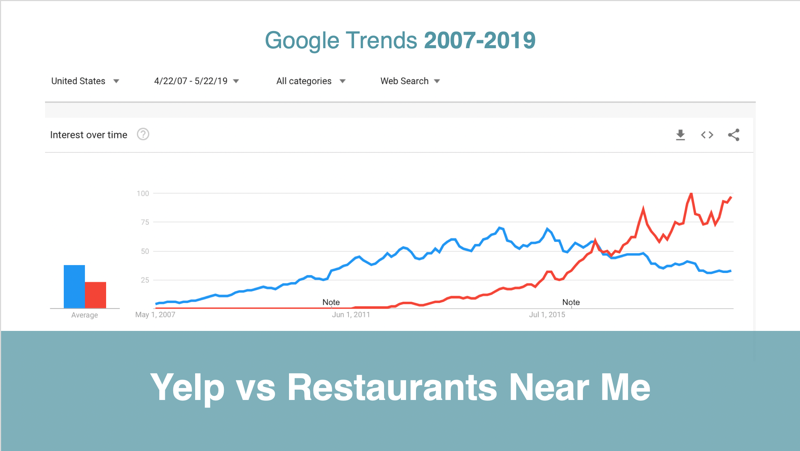
Yelp historically has received significant traffic from Google searches for “yelp” as many users would start there. But in the era of smartphones, users’ behaviors have changed. And Google, often the first stop searchers make, has capitalized on this change. As you can see in the above Google trends chart searches for “yelp” vs. “restaurants near me” has seen the tide switch toward users being directly served by results from Google over the past 5 years.
Restaurants have always been Yelp’s sweet spot and the rise of location-based searches on Google answered with Google results is likely minimizing Yelp’s ability to leverage Google for growth of their monthly users.
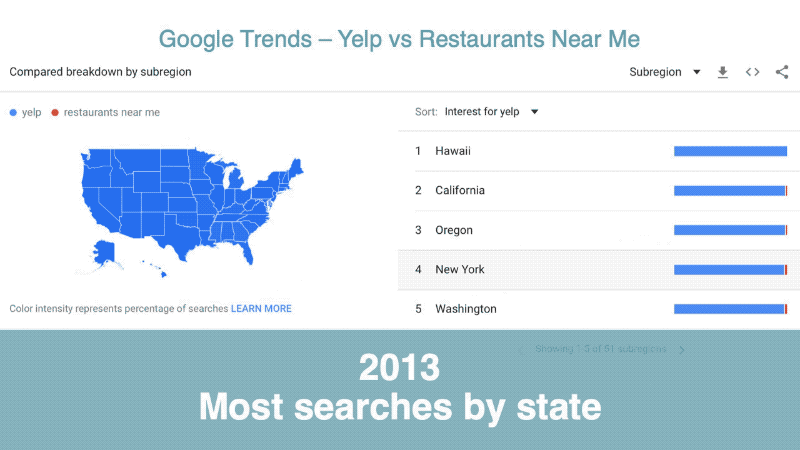
The impact of this can be seen over time where users’ behavior started changing in the south-central area of the US, the weakest region for Yelp. These changed behaviors have steadily spread across the US, leaving few Yelp strongholds today.
Yelp’s Performance in the Real World
With restaurant reviews being a strength of Yelp, we felt that analysis in this vertical is likely predictive of greater market trends. So, we took a look at reviews for a 200+ location restaurant by month over the past four years. The details of that data are illustrative.
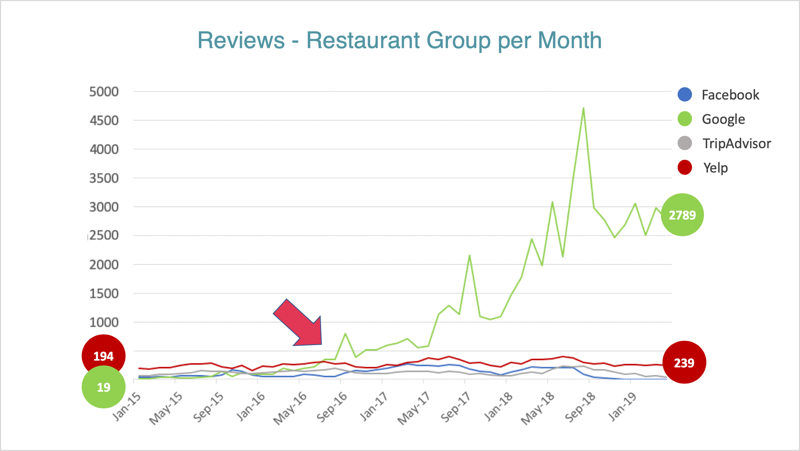
In January 2015, Yelp was generating 10x the number of monthly reviews vs. Google for the same locations. Yelp kept its lead through mid-2016 until Google reviews started to accumulate at an accelerating rate.
Fast forward to Spring 2019 and the restaurant chain was generating roughly the same number of Yelp reviews as in 2015. Google, on the other hand, was accruing reviews at a monthly rate of 10x Yelp’s static volume.
We have found similar patterns in every other vertical that we have examined. The only difference between restaurants and the others industries seems to be the timing of Google’s rise, not the eventual outcome.
What Does It All Mean For Yelp? And For Your Business?
Yelp has survived the winnowing of review sites over the past 5 to 7 years but while they have historic and some current relevance in certain industries and geographies, their role and impact is effectively limited by the business strategies they’ve adapted, changing user behaviors, and market dynamics.
Yelp can often seem larger than life and has managed to capture a fair bit of our mind space but to some extent, their highly visible presence is a function of their bark and not their bite.
They have a storied history and have shown staying power, but being the last person standing in the current context leaves them as a niche player with only a minor ability to impact your business.
